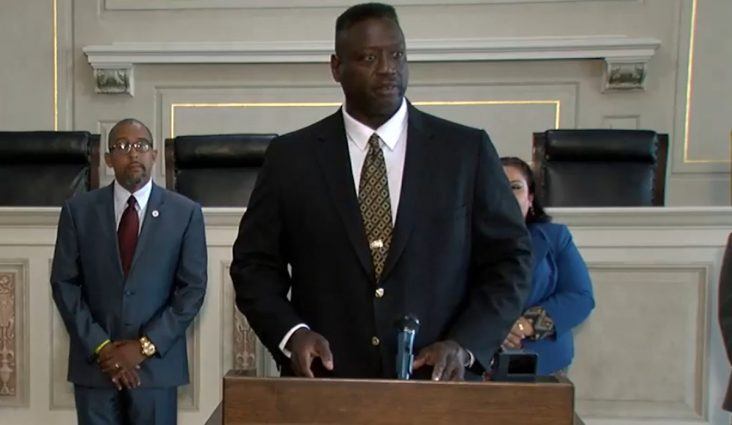Protest leaders included on Gov. Hutchinson’s law enforcement task force
by June 9, 2020 1:10 pm 1,443 views

Fred Weatherspoon, deputy director at the Arkansas Law Enforcement Training Academy, was appointed chair of Gov. Asa Hutchinson's Law Enforcement Task Force.
A law enforcement task force that includes leaders of recent protests in Arkansas is being asked by Gov. Asa Hutchinson for a “wide-ranging set of recommendations” on improving law enforcement, but “defunding the police” will not be part of the review.
The governor on Tuesday (June 9) said “trust is undermined” between citizens and law enforcement following the May 25 murder of George Floyd, a black man, who was choked to death on camera in Minneapolis by white police officer Derek Chauvin. Chauvin and three assisting police officers have been arrested and charged with criminal offenses ranging from second-degree murder to aiding and abetting the murder.
Floyd’s death was one of a growing number of deaths in recent years of black people at the hands of law enforcement. Mayors, governors and other elected officials around the country have in recent days called for reviews of police policies, training and other law enforcement practices, instituted changes targeted at de-escalation, banned certain types of restraint, or taken other actions in response to widespread protests to end systemic racial discrimination in policing.
Gov. Hutchinson said in recent days there is a “recurring theme” of needing to do better with policing and that theme was “reinforced by my discussions with a number of the protest leaders here in Arkansas.”
“They are very genuine, they’re very sincere, and they’re very committed to change and see things improved in terms of the relationship between law enforcement and the community, and also to make sure that we have the right accountability for our officers, and particularly those that do wrong, and particularly those that exercise prejudice in their law enforcement activities,” he said.
Items to be considered by the task force include the adequacy of police training, the process for ensuring accountability of officers, the possibility of a public database of complaints and resolutions with officers, obstacles in recruiting and hiring officers, use of force policies, and how community policing can be improved. The task force must issue a report to the governor by Dec. 31.
Gov. Hutchinson said he is open to a comprehensive review of police standards that have been in place since 1978, but said defunding the police is off the table.
“I also want to be clear that there will not be an agenda item on defunding law enforcement through this task force. Now, it is always a fair discussion as to how funding is used and where the needs are. That discussion is fair and can be a part of this. But, I’ve talked to the members of the task force, and this is not to take away from law enforcement. This is to enhance law enforcement, to make them more trained, to ensure that they have adequate discipline, that they have adequate accountability, as well as the other items that I’ve mentioned.”
“Defund the police” has become a political lightning rod, with President Donald Trump and others taking the term literally to mean a city would not have a police force. Christy Lopez, a professor at Georgetown Law School and a co-director of the school’s Innovative Policing Program, noted in this recent news report that defunding the police means to reduce the demands placed on police and redirect funding to mental health care, housing and other social programs.
Fred Weatherspoon, deputy director at the Arkansas Law Enforcement Training Academy, was appointed chair of the task force. Weatherspoon said the issue is real to him, noting that as a 10-year-old child he did not recognize his father who returned home after being physically abused by police.
“(Abused) to the point that when my mother and my uncle brought him home, that myself and my older brother we ran from him because we didn’t recognize him because of the severity of the beating he had received,” Weatherspoon said.
He also said the task force has a unique chance to reset relationships between citizens and law enforcement.
“This is an amazing opportunity for us in law enforcement to regain the trust of citizens throughout our communities. And this can be done through collaboration, and I think the collaboration starts today with the forming of this committee that has a very important task ahead of it,” he said.
Gov. Hutchinson said recommendations from the task force will likely require action by the Legislature and could include executive orders and organizational changes.
In addition to Weatherspoon, following are members of the task force.
Percy Wilburn, vice chairman of Arkansas Commission of Law Enforcement Standards and Training;
Jami Cook, secretary of the Arkansas Department of Public Safety
Shirley Washington, mayor of Pine Bluff
James Sanders, mayor of Blytheville
Tim Helder, Sheriff of Washington County
Scott Hamilton, CEO and president of Urban League of the State of Arkansas
Rosa Velasquez, Arkansas United
KenDrell Collins, Assistant Federal Public Defender
Bob McMahan, Arkansas Office of Prosecutor Coordinator
Jimmy Warren, citizen activist, Conway
Emma Davis, citizen activist, Van Buren
Tim Campbell, citizen activist, Little Rock
Layla Holloway, citizen activist, Van Buren
Representative from Arkansas Association of Chiefs of Police
Representative from Arkansas Sheriff’s Association
Representative from Arkansas Black Mayor’s Association
Representative from Arkansas State Police
